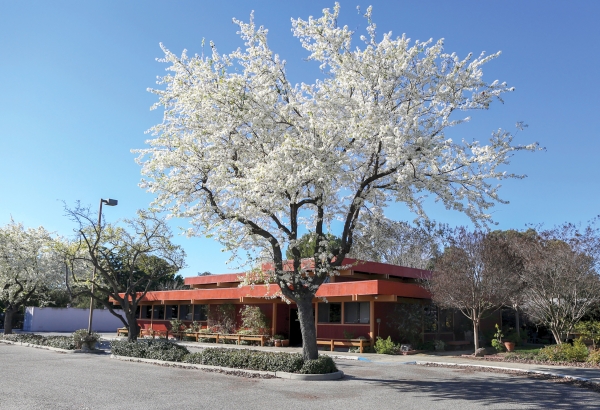A small, Santa Clara County-owned property in south Palo Alto may soon be redeveloped to create an increasingly valuable and rare commodity: affordable housing for adults with disabilities.
The Santa Clara County Board of Supervisors voted unanimously Tuesday to direct staff to develop options for the site at 525 E. Charleston Road, near Middlefield Road. The approximately 0.75-acre site is one of three parcels that the county owns. Two of them are being leased to Gatepath-Abilities United, a nonprofit that provides services to children and adults with developmental disabilities and that leases the properties for $1 per year. The third county-owned parcel is being leased to Challenger School.
Under a proposal that the county is considering, the smaller of the two sites that Gatepath-Abilities United currently leases would be the location of a new housing development geared toward residents with "extremely low" or "very low" incomes and developmental disabilities. That property is scheduled to revert to the county's control in October 2022, when the lease with Gatepath-Abilities United expires.
Supervisor Joe Simitian, who represents Palo Alto on the board, made the proposal to explore building housing on the site. He and his fellow supervisors directed county staff to conduct a feasibility study for the use of the site and to develop a timeline for development of the property so that construction can begin in October 2022, when the property reverts to the county.
In describing his proposal on Tuesday, Simitian noted the perfect "synergy" between the proposed housing project, which would be located next to Gatepath-Abilities United and in close proximity to a church, a park, several schools and the Magical Bridge Playground at Mitchell Park.
"Every now and then you just catch a break," Simitian said at the Tuesday meeting. "Every now and then, you think, 'Boy, this just works.'"
A report from Simitian's office noted that the number of adults in Santa Clara County with developmental disabilities has grown by 47% in the past decade and is projected to continue growing.
"Because of this, we need the affordable housing for persons with developmental disabilities will increase over the coming years," the report states.
The board agreed to support Simitian's proposal after hearing from several residents with autism and from advocates for adults with disabilities. Bryan Neider, CEO of Gatepath-Abilities United, said his organization strongly supports the project, which he said is sorely needed.
"We do have a housing challenge in the Bay Area overall. It is a crisis for the folks that we serve," Neider said.
He noted that there is no new housing for adults with disabilities coming online and described Simitian's proposal as "a ray of light."
"The hope that you provide to our community and the impact you can have by making this housing available is so needed," Neider said.
Jan Stokeley shared his sentiment. As the executive director of Housing Choices, a nonprofit that helps people with disabilities find housing, she has received more than 1,500 referrals over the past year, Stokeley told the board.
"The No. 1 concern we're facing is we see so many adults aging at home with aging parents and there isn't enough affordable housing for them to move into," Stokeley said. "Parents want to support the transition while they're still around and healthy enough to make sure it's a good one, And when a site like this comes along that's so well located in relation to services, transportation, shopping — it's really a unique opportunity to address the need."
Simitian's plan calls for a partnership between the county and Gatepath-Abilities United in which the nonprofit will provide services for the residents at the new site. Gatepath-Abilities United is also looking to consolidate its operations at its larger site on Middlefield Road, around the corner from 525 E. Charleston Road.
Simitian noted in a news release that given the limited incomes that typically accompany individuals with severely disabling conditions, finding affordable housing in the community poses "a special challenge" for these residents.
"And given that community members with developmental disabilities are particularly at-risk of grave harm when they become homeless, it's absolutely crucial that we find ways to keep them housed, with the services they need," Simitian said in the news release.
Under the board's direction, staff is expected to return to the board by the April 21 meeting with information about the property, including the number of units that can potentially be built there.



Comments